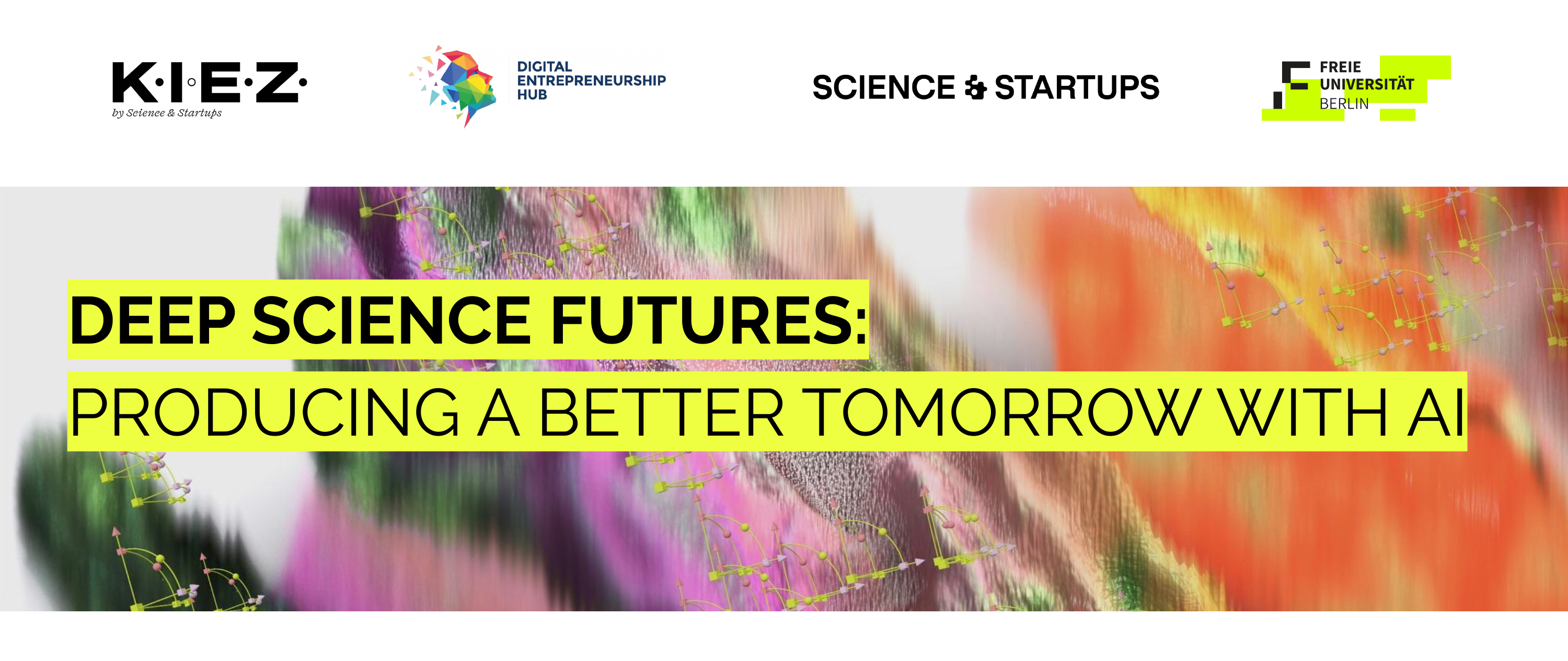| Title | Time | Room | Teacher |
|---|---|---|---|
| Deep Science Futures with AI: An Ideation Workshop for Producing a Better Tomorrow | 17.07.2025 09:30 - 17:00 (Thu) | AI Campus Berlin, Max-Urich-Straße 3, 13355 Berlin | Jonathan Zebhauser, Benjamin Flader |

The Berlin University Alliance (BUA) is an alliance of Freie Universität Berlin, Humboldt-Universität zu Berlin, Technische Universität Berlin and Charité - Universitätsmedizin Berlin. Together, they are pursuing the goal of creating and shaping an integrated research space in Berlin. This alliance aims to establish Berlin as a leading international science location. All workshops and events offered by the Graduate Studies Support Program are funded by the BUA and therefore free of charge.
Participation
For doctoral researchers and postdocs of all disciplines. No prior knowledge and experience on programming, Artificial Intelligence technologies, statistics or innovation needed. This is not a coding workshop but aims to provide you with a good understanding of when to apply AI.
Before booking a workshop, please make sure that you can attend for the entire duration. Please check our terms and conditions.
Objectives
Content and Outcomes of the workshop:
● Assess the potentials of Artificial Intelligence technologies, including deep learning, for different use cases
● Develop ideas for AI applications that have a positive impact on our society
● Shape your ideas into feasible concepts
● Discuss opportunities and risks of AI for real world challenges
● Design your AI-based prototype, without or with coding (your choice)
Why and how?
Artificial Intelligence will shape human life and work in our century profoundly. Together, we will explore how AI can be brought to good use for society and individuals. We provide entry-level methods for assessing use cases for AI and walk with you through your first “no code” prototype or paper sketch. Join us in shaping and reflecting this new wave of AI-based innovations.
To frame our joint undertaking, we use the Sustainable Development Goals (SDGs) proposed by the UN. The SDGs include all sort of fields such as education, industrial or economic contexts, societal inequalities, sustainability, peace, or climate, to name only some.
Content
1) Do we need AI – or how does AI solve my problems?
What is AI and ML? What problems can AI effectively solve? What is the current impact of AI technology on economy, society, and ecology? How can you apply AI to your domain or a given problem? AI needs you – or why AI applications rely on your domain knowledge?
2) Shaping your idea in a team:
From understanding the underlying problem in depth, we move to crafting a solution that benefits the problem’s stakeholders. You work in small teams.
3) Creating your first AI-based application:
Work step-by-step towards your first AI-based prototype. We use a no-code tool (but you can use code as well if you like). If you have data related to the problem you want to work on, bring it to the workshop!
Further Information
Preparation: Please bring a problem you want to work on. You may use the SDGs as a guiding frame. If you do not identify a specific idea for application beforehand, we will guide you through the necessary steps. Both individuals and teams are welcome.
Why you: This course is tailor-made for doctoral researchers and postdocs who have gathered domain expertise, whether it is from the life sciences, geography, humanities, or social sciences. You conceptualize concrete applications for AI. We will provide guidance and tools to quickly create scenarios of applications for this “new” technology. Together, we will discover ideas and concepts for AI-based solutions to a real-world problem that aims to make a difference.
Continuing Support: We help you all the way – even after our workshop: For individuals or teams who seek to take further steps to realize their ideas, we support you in finding collaboration opportunities with the Künstliche Intelligenz Entrepreneurship Zentrum (K.I.E.Z.) and Science & Startups, who can help you to get the funding and expertise necessary for realizing such an idea, such as the Bridge to Market Program.
The course is a joint offer of Digital Entrepreneurship Hub, Freie Universität Berlin and K.I.E.Z.
Please note
For updates and announcemnets register to our DRS Newsletter.
Also check out workshops at the BUA partner institutions that are available for you free of charge: Graduate Studies Support Program.
For workshops held online, participation is allowed under the following conditions: a working camera that is turned on and a microphone to allow active participation in discussions and group work. Headphones must also be used to protect other participants from office eavesdroppers. In this context, we would also like to refer to the rules for digital courses at Freie Universität Berlin (Code of Conduct).
Doctoral programs calculate credits that you can earn by participating in our workshops based on the transcripts (8 work units result in 0.5 credit points; 1 work unit equals 45 min. workshop-time). In the case of mini workshops (less than 8 hours work units), these are calculated on a pro rata basis using the work units. Be aware: You must have attended enough short workshops to have accumulated enough “work units” to be eligible for credit transfer (i.e. 2x 3h workshop = 2x 4 work units à 45 min = 8 work units = 0.5 credits)
